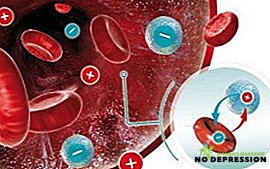The problem of missed abortion can face any woman. Age, of course, plays a significant role, but is not at all an indicator.
So, women are at risk:
- over 35 years old;
- previously resorted to the medical or surgical method of abortion;
- having a previous ectopic pregnancy;
- having any abnormal development of the uterus.
So, what is the fading of pregnancy and why does it occur?
What it is?
Stopping the growth and development of the fetus (that is, its intrauterine death) for up to 28 weeks is called missed abortion. Since normal pregnancy should end in childbirth, missed abortion is called pathology.
Most often it occurs in the first trimester, for up to 12 weeks. However, this is not at all an indicator, since it can be identified even at a later time - in the second, and even the third trimester.
What is the danger of such a pregnancy?
 Zamerzhasya pregnancy, in the absence of the necessary treatment, a negative impact on the health of women. In some cases, nature takes over and spontaneous miscarriage occurs, which causes minimal harm to women's health.
Zamerzhasya pregnancy, in the absence of the necessary treatment, a negative impact on the health of women. In some cases, nature takes over and spontaneous miscarriage occurs, which causes minimal harm to women's health.
In other cases, the woman is required to resort to the artificial termination of such a pregnancy.
If the fetus is not removed in time, DIC syndrome (disseminated intravascular coagulation) may develop, in which the blood stops clotting and any bleeding can be fatal. In addition, the dead fetus, if not removed from the uterus in time, can cause its inflammation and the development of such an extremely dangerous disease as sepsis (blood infection).
Freezing first trimester pregnancy: causes
The most dangerous period of pregnancy is considered the first trimester (1-12 week), because a greater number of pathologies occurs in this period. Why fetal death occurs precisely in this period, even doctors cannot answer. Nevertheless, it is customary to single out several reasons for this. Most often, the growth of the fetus stops for one or even several of the following reasons:
- Bad genetics, as a result of which fetal death occurs even at the stage of formation of important internal organs (up to 8 weeks). The culprit of bad genes can be both mother, father, and nature, because sometimes an unsuccessful association of parental genes just happens, as a result of which the fetus freezes in the early period. When the fetus fades more than 3 times in a row, the cause, as a rule, is a genetic disorder.
- Hormonal failure, which manifests itself in two ways: a lack of progesterone or an excess of male hormone. With a lack of progesterone in most cases, the placenta exfoliates from the uterus, resulting in a miscarriage, so it is extremely important to identify this deviation before pregnancy. To do this, it is advisable to visit a doctor who will tell you exactly what tests you need to pass.

- The mother has a negative Rh factor, and the father has a positive, resulting in a conflict of rhesus. As a result, mother’s antibodies attack the fetus. This situation is especially dangerous for a woman who has undergone an abortion, because with each artificial interruption of pregnancy, the number of antibodies hostile to the fetus in the body increases, with the result that he simply cannot resist them.
- Antifosolipid syndrome, which causes the formation of blood clots in the placenta. Such blood clots, in turn, violate the nutrition of the fetus, as a result of which he dies.
- Infectious diseases. The most dangerous during pregnancy are diseases such as cytomegalovirus and rubella. However, if mommy had previously been ill with them, then they are not afraid of the fetus. A simple acute respiratory viral infection, not to mention the flu, which is severe, can be fatal for him: high fever, intoxication of the body. Such symptoms of the disease disrupt the work of the circulatory system and, as a result, cause first the starvation of the fetus, and then its death.
- Wrong way of life as a mother and father. Fruit freezing can occur due to smoking, drinking alcohol, using drugs, malnutrition, and so on.
- The presence of the mother of such diseases as diabetes.
- Constant stress.
The first signs of missed abortion in the first trimester
In most cases, pregnancy subsides in the early stages passes unnoticed by the mother. There are also frequent cases when a woman does not even suspect about her.
 For example, pregnancy came and, accordingly, there was a delay in menstruation, but after a couple of days for some unknown reason, there was a spontaneous miscarriage.
For example, pregnancy came and, accordingly, there was a delay in menstruation, but after a couple of days for some unknown reason, there was a spontaneous miscarriage.
This scenario is possible only for those who are not planning a pregnancy, as women who dream of becoming a mother monitor the basal temperature and rush to do a pregnancy test at the very first delay.
For them, any pregnancy will not go unnoticed.
The first signs of missed abortion in the first trimester of pregnancy include the following:
- the sudden disappearance of toxicosis and eating habits;
- decrease in basal temperature;
- cessation of breast growth;
- insignificant increase in body temperature;
- the appearance of bloody or blood secretions.
If you identify at least one of the symptoms, it is recommended to go to a doctor's appointment, who will be able to make an accurate diagnosis and thereby allay all fears.
Signs of missed abortion in the second and third trimester
In later terms, in the second and third trimester, one can add to the above symptoms except the cessation of fetal movements. Starting from week 16 and up, the signs of fetal death are exactly the same. In any case, only a doctor can diagnose. And regardless of the duration of pregnancy, for the diagnosis will need to undergo the following examination:
- Ultrasound;
- examination on the gynecological chair, where the doctor compares the size of the uterus with the gestational age.
In the early stages, when the ultrasound does not yet show the fetal heartbeat, the most informative is the analysis of hCG. If the fetus does not develop, the level of hCG will be significantly below the norm corresponding to the gestational age.
However, there are some pitfalls here. For example, if the hormonal background remained at the same level after fetal fading, the analysis of hCG will show an incorrect result, therefore, it cannot be relied on in any way.
What is the treatment of missed abortion?
After confirming the diagnosis, the woman must first think about her health. To do this, you need to remove the dead fetus from the uterus, because otherwise it can cause significant damage to health. The doctor may suggest the following removal methods:
- Medication, which is possible only with gestational age up to 8 weeks.
- Surgical intervention, which involves curettage of the uterus. After that, it will be necessary to undergo treatment with antibacterial drugs. Two weeks after curettage, ultrasound is monitored by ultrasound.
 In some cases, doctors are not in a hurry to make any appointments, because after a spontaneous miscarriage, the negative effects are most minimal.
In some cases, doctors are not in a hurry to make any appointments, because after a spontaneous miscarriage, the negative effects are most minimal.
Pathology treatment consists of a complete examination of both parents. First of all, they need to be tested for hormones of both the thyroid gland and sex, because they provoke fetal fading in the first trimeter.
Further, these hormones are carefully examined to identify the causes of the pathology. Treatment prescribed for the results.
In order to rehabilitate and restore women's health, the doctor prescribes means for contraception, multivitamins and good nutrition. Such treatment not only contributes to the restoration of health, but also prepares the body for the next conception and carrying a child.
Is pregnancy a sentence?
In no case is pregnancy a sentence. Rather, on the contrary. However, women who are faced with the problem of miscarriage are afraid to even think about the next pregnancy.
It is during this period that the regular monthly cycle is established and the body is restored. Moreover, a child conceived after a frozen first, as well as a second pregnancy, is born completely healthy.
How not to re-face the pathology?
Having recovered from a frozen pregnancy, women, as a rule, are afraid of a repetition of the story, so they are doing everything possible to avoid such a situation. The first step in planning a pregnancy is to contact a doctor for a thorough examination. Based on the history of the disease and, based on the individual indicators of the body, the doctor prescribes the necessary tests.
Despite the fact that for each woman are assigned individual tests, there is a list of activities required by all without exception. It:
- Ultrasound of the pelvic organs;
- a blood test to detect the level of homocysteine and autoantibodies;
- smear on various infections;
- ToRHC-complex, which allows to detect the presence of infections that are dangerous for pregnant women in the body.
Also, future parents need to visit a doctor genetics to identify their genetic compatibility. Performing all these actions will help the woman to avoid a recurrence of the situation with the miscarriage in the future.
Conclusion
- Pregnancy during pregnancy is an extremely dangerous pathology for the life and health of a woman.
- Most often occurs in early pregnancy, but can occur in the second, third trimester.
- In the first trimester, it is extremely difficult to identify it, even for a doctor.
- In the event of confirmation of fetal fading, in order to preserve the health of the woman, it must be removed in one of two ways, directly dependent on the duration of pregnancy: medicamentally (using special preparations) or surgically (by curettage of the uterus).
- For planning re-pregnancy you need to wait at least six months.
- After removal of a frozen fetus, it is necessary to undergo an examination to establish the cause of its fading.
In the next video - additional information about missed abortion.













